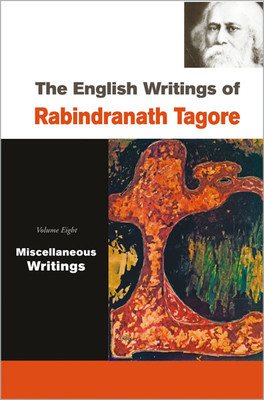The English Writings of Rabindranath Tagore Miscellaneous Writings 01 Edition(English, Hardcover, unknown)
Quick Overview
Product Price Comparison
TagoreŌĆÖs English writingsŌĆöoriginals and translationsŌĆöhave not received the attention that they deserve. The purpose of this edition is to make the English writings of Tagore available to the widest possible range of readers interested in the writings of Tagore all over the world, with just the bare, minimum information necessary for appreciating the writings, and leave the critical assessment to the readers themselves. There may be two possible reasons for the neglect of TagoreŌĆÖs English writings. Firstly, TagoreŌĆÖs prolific output, Shakespearean felicity and protean plasticity as a Bengali poet, who, though well-versed in English, chose to write in the medium of his mother tongue for nearly the first fifty years of his life, and there is hardly any literary form that he did not touch upon and turn into gold. His creative genius found expression in poems, plays, novels, essays, short stories, satirical pieces, textbooks for children, and songs of all kinds. The only literary form that he did not try is epic. But in his long, eventful and creative eighty years of life he virtually ŌĆślivedŌĆÖ an epic. It is largely due to his mighty stature as a Bengali poet that nobody really bothered about his English writings and his own translations of his own writings. Secondly, it is owing to the supposedly ŌĆśpoorŌĆÖ quality of his translations subsequent to the translation of Gitanjali. It was only after Tagore received the Nobel Prize for literature in 1913 that there was a growing demand for his writings in the West, and as Tagore was not apparently satisfied by the translations that othersŌĆömainly his admirersŌĆömade, he began to translate his writings himself. But the tremendous haste with which he had to translate, possibly affected the quality of translations. Come what may, the point is whether TagoreŌĆÖs English translations are good or bad, whether the translation furthered his reputation or damaged it, is immaterial. The fact of the matter is that they are his, and his own translation of whatever quality it may be is more valuable to a Tagore lover than the best translation made by somebody else, as Van GoghŌĆÖs one original single scratch is more valuable than the best possible copy by some other artist. The value of TagoreŌĆÖs English writings lies here : they constitute an important part of his total oeuvre, add a new magnificent dimension to it and offer us a glimpse into the mystique of the creative anxiety that could have haunted even the greatest writer of the twentieth century, about his possible reception in an alien culture. About Author: Rabindranath Tagore was born on 7 May 1861 in an old aristocratic family of the nineteenth century Calcutta. Right from his teens he steadily grew as a writer and received the Nobel Prize for literature in 1913. But his creativity was in full form till his death on 7 August 1941. His long life of eighty years was marked by ceaseless and torrential flow of creativity manifested in the richness and variety of all kinds of literary forms. But he was not just a writer. He was also a great composer of songs and himself a singer as well as a performer. His creativity found magnificent manifestations in dance, drama, dance-drama, music, painting and various original organizational activities. Touching the kindred points of heaven and earth, he was both a man of action and of contemplation, a nationalist and an internationalist, a man of royal grandeur like his grandfather, Prince Dwarakanath Tagore, and an ascetic like his father, Maharshi Devendranath Tagore. He was a poet and a painter, a dramatist and an actor, a philosopher and a social reformer, an educationist and a humanist. In his philosophy of life the best of the East and that of the West were reconciled into a harmonious whole, enriching the quality and substance of life which he always saw steady and whole. His inclusive mind aspired after the Universal Man shining in the glory of creation and joie de vivre. TagoreŌĆÖs unfailing faith in man and divinity, his concern for women and for children, his sympathy for the poor and the downtrodden, his philosophical speculations and practical wisdom, his perception of the zeitgeist are all inscribed in his writings in a magnificent synthesis of philosophical profundity and aesthetic luxuriance. With the passage of time Tagore has only grown in stature and is now reckoned as an increasingly significant and complex personality. It is always rewarding to revisit Tagore whether as an artist or a sentinel, a poet or a philosopher, a complex individual or a fine exponent of the Bengal Renaissance.


